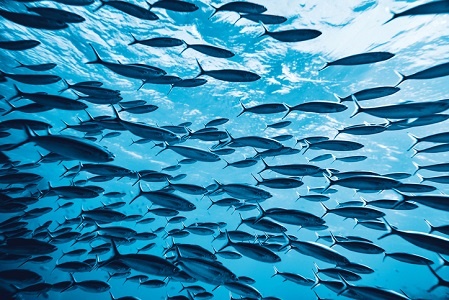
Parent24 is republishing Curious Kids, a series for children, with permission under a Creative Commons license.
When fish get thirsty do they drink sea water? – Torben, aged nine, Sussex, UK.
This is a great question, Torben, thanks very much for sending it in.
The short answer is yes, some fish do drink seawater – but not all of them. Fish are amazing animals, and have some very cool solutions to living in water. Naturally, different types of fish have evolved different solutions.
The bony kinds of fish that live in the sea – such as cod, herring, tuna and so on – have a few ways of getting water in and out of the body. As well as swallowing and peeing, like humans do, these fish can pass it through their skin and gills.
To understand how this works, you first need to know that bony fish have a different concentration of salt in their bodies to their environment. This means they’re more or less salty than the water they swim in.
The bodies of marine fish (which live in the sea) are less salty than the water they swim in, while the bodies of freshwater fish (which live in rivers and lakes) are more salty than the water they swim in.
Both marine and freshwater fish have to control the amount of water and salt in their bodies, to stay healthy and hydrated.
Hard to stay hydrated
Bony marine fish are constantly losing water from their body, through a process called “osmosis”“. During osmosis, water moves through a membrane (like skin), from areas of lower concentration to areas of higher concentration.
Remember, the body of a marine fish is less salty than the seawater it swims in – which means it has a lower concentration of salt. So these fish actually lose water through osmosis: it passes from their body, through their skin and gills, out into the sea.

Thirsty work.
Since they’re constantly losing water this way, these fish have to drink a lot of seawater to stay hydrated.
You might be interested to know that the opposite happens in freshwater fish. Water flows into their body through osmosis, instead of out. This means they don’t generally need to drink – but they do have to pee a lot.
We all know that too much salt is bad for us. So of course, an animal that drinks seawater must have a way to get rid of excess salt.
Marine fish have kidneys, which pump excess salt into their pee so they can get it out of their bodies. They also have special cells in their gills that pump excess salt out into the sea. Together, these two systems mean that marine fish can stay hydrated.
Salty sharks
Sharks have evolved a completely different system. Their bodies have a slightly higher concentration of salt than seawater. This means they don’t have the problem that bony fish have, of losing water through their skin all the time.
Sharks have high levels of waste chemicals – called urea and trimethylamine N-oxide – in their body, which other animals would usually get rid of. Sharks keep them in their body, which keeps them "salty”.
Sharks take in small amounts of water through their gills (by osmosis – because they are slightly saltier than the sea) which means they don’t directly have to drink.
Sharks also have a salt gland (in their rectum) to get rid of any excess salt they may have.
The problem of drinking seawater isn’t just for fish. Some seabirds – albatrosses, for example – have to drink seawater too. Like sharks, these seabirds have a salt gland to get rid of excess salt. But on an albatross it is found at the top of the bird’s beak.
Children can have their own questions answered by experts – just send them in to Curious Kids, along with the child’s first name, age and town or city. You can:
- email curiouskids@theconversation.com
- tweet us @ConversationUK with #curiouskids
- DM us on Instagram @theconversationdotcom
Here are some more Curious Kids articles, written by academic experts:
Why do some animals have two different coloured eyes? – George, aged ten, Hethersett, UK.
How high could I jump on the moon? – Miles, aged five, London, UK.
Claire Lacey, PhD Candidate in Biology, University of St Andrews
This article is republished from The Conversation under a Creative Commons license. Read the original article.
Chat back:
Share your story with us, and we could publish your mail. Anonymous contributions are welcome.
Read more:
What is the smallest animal ever?
Why are the bubbles in fizzy drinks so small? The ones I blow are much bigger




 Publications
Publications
 Partners
Partners















